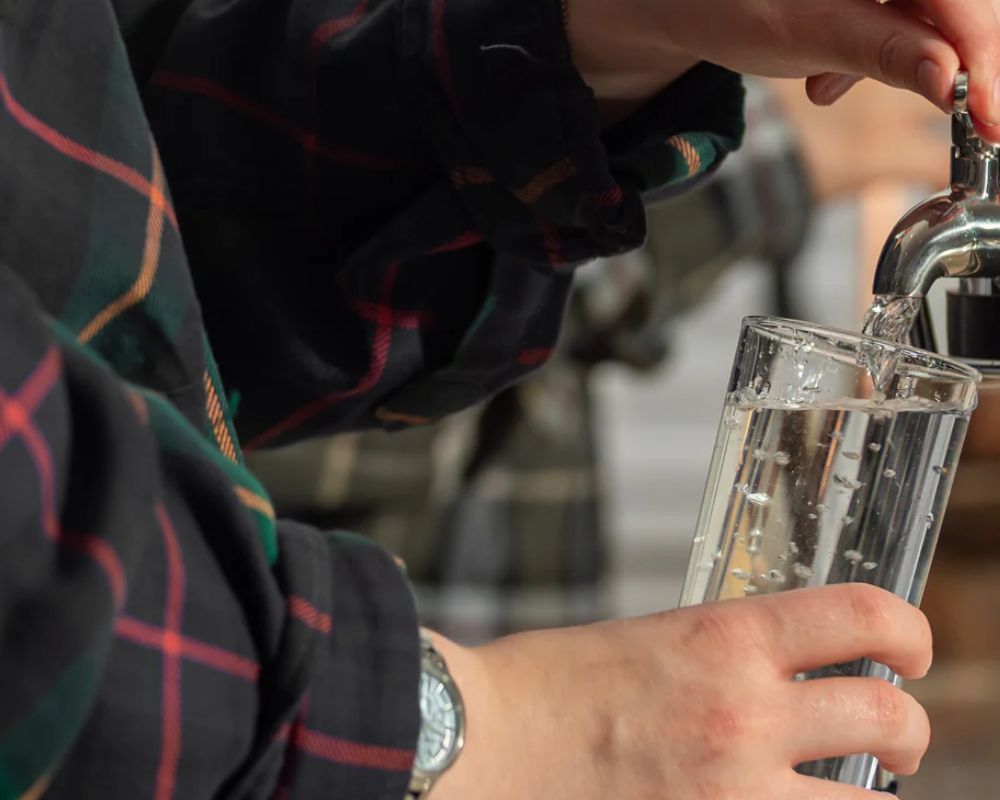Results from our recent survey reveal how workplace routines, taste perceptions, and trust issues shape the UK’s hydration divide.
Our survey of 1,000 UK adults has uncovered the truth about how people hydrate at home versus at work. While most agree that drinking enough water improves wellbeing, focus and productivity, the data shows a clear gap in hydration habits.
From home kitchens to office break rooms, a distinct behavioural gap emerges. Nearly 39% of people say they drink more water at home, versus in the office. And when it comes to what they’re drinking, bottled water dominates the workplace, despite the growing environmental concern around single-use plastics, alongside the cost of choosing bottled water!
So, what is the truth around how the nation's hydration habits are at home versus in the office? Here are some of our key findings at a glance:
● 47.8% of UK workers drink bottled water at work, highlighting a major reliance on single-use plastics.
● 94.1% say hydration improves concentration and productivity, reinforcing its importance in overall well-being.
● 32.8% would drink more tap water at work if it tasted better, making flavour the biggest barrier for choosing tap water.
● 38.8% drink more water at home than at work (30.6%), suggesting a hydration gap driven by environment.
● 43.3% already use a home water filter, and another 18.1% are considering one.
The Hydration Divide: Home vs. Work.
At home, hydration is often part of people’s routine, with easy access to preferred water sources and personal control over quality. In contrast, workplace environments present challenges such as back to back meetings, limited access to water, and concerns about the taste and quality of tap water.
Our survey also revealed that 32.8% of respondents said better-tasting tap water would encourage them to drink more at work. Despite the popular belief that tap water doesn’t have a taste.
Interestingly, and despite recent reports in the media, more than 60% of our survey participants trusted the safety of their local tap water. Meaning that taste remains a significant factor influencing preferences.
Our NPD & Technical Director, Joy, notes: “Our hydration habits are deeply influenced by the environments we spend time in. This research shows that taste and accessibility are key barriers at work. Addressing these concerns could unlock healthier, more sustainable hydration choices that benefit wellbeing and reduce reliance on single-use plastics.”
The Benefits of Using a Water Filtration System
With nearly half of the respondents relying on bottled water at work despite environmental concerns, and many more using or considering water filters at home, it’s clear that people want better water solutions. Installing a solution at home, such as our under sink water filter systems, offers several advantages that can help bridge the hydration gap between home and work:
-
Improved Taste
The filtration process takes out impurities that can cause the metallic taste and bleachy odours people find present in their drinking water -
Enhanced Health and Safety
Advanced filtration processes utilise innovative technology to reduce harmful substances such as lead, chlorine and other common contaminants. -
Environmentally Friendly
Using a water filter significantly reduces the reliance on single-use plastic bottles, helping to lower plastic waste and carbon footprints. Ceramic water filters can also help to reduce your carbon footprint with their ability to be added to compost. -
Cost-Effective and Convenient
Filtered water is often more economical over time compared to constantly purchasing bottled water. -
Supports Wellbeing and Productivity
Hydration is crucial for maintaining focus and energy throughout the day it can also support skin health and general wellness.
Time to bin the bottle?
Despite growing public awareness around plastic pollution, nearly half of UK workers surveyed still reach for bottled water at work - a behaviour that doesn't line up with wider sustainability goals.
Why? It comes down to convenience, habit, and perception. Bottled water still feels like the “safe” or “better-tasting” option, especially in environments where the alternative isn’t appealing or trusted. But with hydration so closely tied to wellbeing and performance, this trade-off is starting to look outdated.
What the Data Tells Us About Changing Habits
One of the most encouraging takeaways from our survey is that these preferences aren't fixed. The data doesn’t show people choosing plastic out of loyalty - it shows people making pragmatic choices based on their environment.
In fact, many are open to change if the conditions are right:
- 32.8% said they’d drink more tap water at work if it simply tasted better
- 19.2% would be more likely to drink tap water if their employer provided a reusable bottle
- And a large portion of people are already improving water quality at home with water filter systems
This is a chance to understand why bottled water still dominates and what the subtle factors are that influence our choices. It’s not always about what we care about most; it’s often about what’s most convenient. Especially in the fast-paced world, where people often seek quicker solutions for common concerns.
When we talk about water access, taste really does shape how and what we choose to drink. Having easy access to a reusable bottle with a water filter inside, or having a filtered water system available at work, can naturally encourage healthier habits. It’s a simple step that makes a big difference to both your hydration levels and the planet.
Joy continues: “These findings highlight how much our environment shapes our hydration habits. It’s encouraging to see that so many people are thinking about the quality and taste of their water, both at home and at work. This kind of data helps us understand where the real barriers are and where small changes, like improving taste, could make a meaningful difference in daily routines.”
A Smarter, Greener Way to Hydrate
This snapshot of the UK’s water habits offers a deeper understanding of how the UK public approaches hydration in different spaces. From the home to the workplace, it’s clear that convenience, taste, and trust play significant roles in how we stay hydrated.
What’s clear is that hydration is about more than health. It intersects with productivity, sustainability, and personal habits. This research acts as a springboard to conversations about how we live, work, and care for both ourselves and the planet.
Methodology
To gain insight into hydration habits across different environments, we conducted a quantitative survey of 1,000 UK adults aged 18 and over. The survey was designed to explore patterns of water consumption at home versus work, attitudes towards tap and bottled water, and factors influencing hydration choices.






